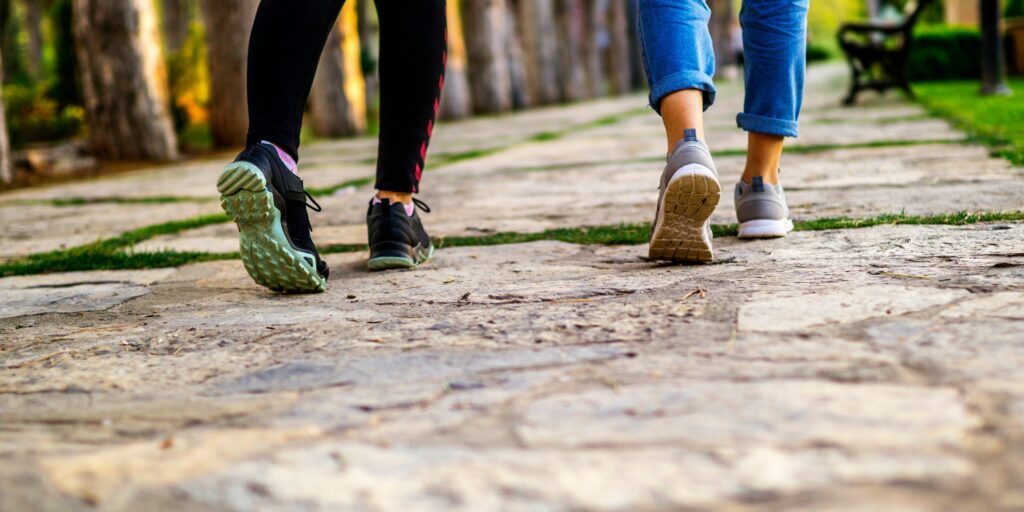Small Steps for Wellbeing

May is National Walking Month. A month that means we should consider the health and wellbeing benefits of walking, keeping active and being outdoors. As part of our Active Calderdale programme, we are not only talking the talk about this activity, but walking the walk through a range of initiatives and projects co-ordinated by our Active Calderdale Team in collaboration with many other service areas of HOT.
This year, the awareness campaign is encouraging individuals and communities to #Try20 minutes of walking each day throughout the month of May. As part of our Community & Wellbeing Service, Active Calderdale is a programme that is dedicated to embedding activity into every part of daily life and helping educate our local community about the benefits of staying active through walking…
It’s good for your mental health

Physical activity has a huge potential to enhance our wellbeing. Even a short burst of 10 minutes’ brisk walking increases our mental alertness, energy and positive mood. So, imagine what walking for just 20 minutes can do?! Participation in regular physical activity can increase our self-esteem and can reduce stress and anxiety.
But it’s not just about the occasional one-off feel good factor. Having a consistent routine that focusses on being active, through walking for example, can have multiple benefits when it comes to mental wellbeing.
Walking independently or in a group can enhance mood and sleep quality. Additionally, as we’ve highlighted recently as part of stress awareness month, walking and keeping active can reduce stress, anxiety and fatigue.
According to Walking for Health charity (1), physically active people have up to a 30% reduced risk of becoming depressed, and staying active helps those who are depressed recover. In the older generation, staying active can improve cognitive function, memory, attention and processing speed, and reduce the risk of cognitive decline and dementia.
It’s good for your Physical Health

Did you know that it is recommended that we participate in 150 minutes of exercise per week (2)? Walking can contribute to this and, if you pick up the pace a little, you can begin to build your stamina, burn excess calories and make your heart healthier.
Not only is walking a completely free and easy mode of exercise, it is one of the most accessible ways to get more active, lose weight and become healthier. By making simple changes to your daily life and replacing the elevator for stairs, car for foot or taking more opportunities to walk, you can greatly impact your physical health.
The good thing about walking is that you don’t have to be fit to start and become more active. Start with small steps and build your way up to a level you feel comfortable with. Even a brisk 10-minute daily walk has lots of health benefits and counts towards your recommended 150 minutes.
It’s good for the air we breathe

By taking the opportunity to walk more in the outdoors, more often, we can gradually reduce the amount of air pollution we generate.
It may seem strange that walking in polluted areas promotes less pollution, but unless changes are made to our collective travel and activity behaviour, the quality of the air we breathe will only continue to deteriorate.
The COVID Pandemic was a benchmark for this, as people took to the streets by foot more for exercise and fewer people were driving to work or for social activities (3). The impact this had on our air quality was impressive; “18% of all people found it easier to breathe during the lockdown, which increases to 21% for residents of any urban area, and 36% for London residents”. The figures rose to “29% for those with asthma and 30% for those with a cardiovascular disease”.
It’s estimated that 5.2 million car trips could be saved over a year through initiatives like National Walking Month. These car trips will equate to approximately 8.5 million miles of car journeys removed from our roads.
It is this decrease in car travel that could mean a potential saving of approximately 2,500 tonnes of carbon dioxide equivalents (4). Small steps contribute to impressive results!
It’s good for the Planet’s Health

Walking to reduce our individual impact on air quality is just one way we can improve the planet’s health. It all has a knock-on effect on creating a cleaner environment.
Travelling by foot can also support local biodiversity. We can reduce our reliance on fossil fuels by walking instead of driving, which in turn can help to slow down the rate of climate change. Something that we’re all acutely aware of.
Climate change is one of the biggest threats to biodiversity. With increasing earth temperatures and weather becoming more unpredictable, fewer plant and animal species can survive.
Switching to walking or cycling for more of our shorter journeys helps to protect biodiversity (5). It creates less noise, less air pollution, and results in fewer emissions that are warming the atmosphere.
Our purpose here at HOT is to create a vibrant multi-cultural and self-sustaining community. We also care about environmental sustainability, and are committed to bringing communities together. Through the work we deliver to enable opportunities for people to become more active, we are able to fulfil our purpose and live our values for maximum impact.
Find out more about Active Calderdale here:

Sources:
- https://www.walkingforhealth.org.uk/get-walking/why-walk/healthy-minds#:~:text=A%20good%20walk%20can%20do%20wonders%20for%20your%20mental%20wellbeing.&text=It%20improves%20self%2Dperception%20and,those%20who%20are%20depressed%20recover.
- https://www.nhs.uk/live-well/exercise/running-and-aerobic-exercises/walking-for-health/#:~:text=Walking%20is%20simple%2C%20free%20and,have%20to%20walk%20for%20hours.
- https://ukparliament.shorthandstories.com/pandemic-air-quality-EFRA-report/index.html
- https://publications.parliament.uk/pa/cm5801/cmselect/cmenvfru/468/46810.htm
- https://www.sustrans.org.uk/our-blog/get-active/2020/in-your-community/how-does-walking-and-cycling-help-to-protect-the-environment#:~:text=Switching%20to%20walking%20or%20cycling,and%20to%20plant%20and%20wildlife.
